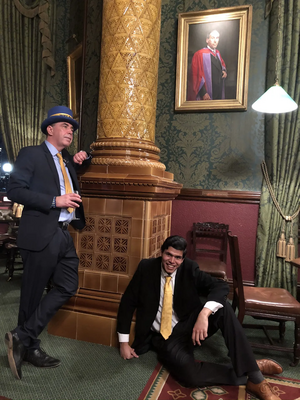Rebels with a cause – School Strike 4 Climate and XR


https://www.facebook.com/greenlibdems/posts/3943069649044229The involvement of young people in climate change issues is not something which has suddenly emerged in the past few years. We may recall the impassioned address of 13-year-oldSevern Suzuki at the 1992 Rio Earth Summit speaking on behalf of 12- and 13-year olds trying to make a difference. In Australia there has been a long history of youth involvement in climate change issues. As far back as 1970 Australian schoolchildren were involved in designing research projects on pollution and public attitudes to the environment. But despite these involvements nothing really changed.
Perhaps the turning point in terms of youth involvement in environmental issues was Al Gore's 2008 call for action to young people looking at the future of the planet, stating that the stage had been reached where it was time for civil disobedience. The School strike for climate movement has shown that civil disobedience, even in its mildest forms, can effectively carry a strong and clear message.
Ever since the then 15-year-old Greta Thunberg decided to stop going to school on Fridays and instead protest on climate change outside the Swedish Parliament, there has been a significant expansion in similar activities in other parts of the world. Whilst it might be said that every generation of students find something to protest about, it seems that climate change and the future of the planet is something of more fundamental importance and significance to this generation of young persons. In the USA the 'Zero Hour' movement reflected the concerns of the young in the United States.
Reports on climate change, notably that of the Inter-governmental Panel on Climate Change, has given the school strike movement a relevance and potency, given that the children of youth of today will be directly affected should appropriate action not be taken.
The school strike movement is also one which has specific goals rather than simply being a general protest over climate change. For example, the movement seeks to-
- Have the UK Government declare a climate emergency and take steps to educate the public as to the seriousness of climate change and its potential consequences for the planet.
- They also seek the ecological crisis to be made part of the national curriculum. In May it was announced that Labour would make climate change a core part of the national curriculum from primary school onwards. A petition set up by school pupils in Oxford calling for more lessons on climate change received more than 72,000 signatures.
In May teachers at the Conference of the National Education Union backed a motion calling on school staff to stand in full solidarity with students striking against climate change. We can therefore see that the school strike movement as a manifestation of students concern about climate change has had a significant effect. School leaders at the annual conference of the National Association of Head Teachers backed a motion calling on schools to incorporate information on the potential for global catastrophe into learning plans. The announcement by Labour has vindicated the school strike movement's demand that climate change be put at the forefront of the education system.
Further, the school strike movement want young people to be included in decision making around issues relating to climate change. To achieve this, they are calling on the Government to lower the age of voting to 16. The school strike movement has been successful in seeing climate change put to the forefront of the political agenda. The UN Climate meeting in Katowice, Poland in December saw a highly visible presence of young people. As Conner Rousseau, a Spokesperson for the Flemish Socialist Party in Belgium has said, 'They have put the climate issue on the public agenda'.
In the UK the movement has sparked a national debate forcing politicians, parents and teachers to seriously contemplate climate change issues. In short, the school strike movement has been effective in its goal of getting people to talk about climate change. They have also been effective in garnering support from people who matter, from prominent scientists to leaders in education. The movement has shown it will not be fobbed off or patronised when it comes to climate change issues. The movement has shown that civil disobedience can be both a powerful and a dignified means of protest. It contrasts with Extinction Rebellion's strategy of causing obstruction as a means of protest.
It is a movement which embellishes the principle that the medium is in the message, It has been effective as a means of showing that self-sacrifice, in this case giving up one's right to education, for a cause can powerfully impact the message, in the same way, for example that a hunger strike can. Indeed, it can be said that the school strike movement has been successful as a means of education itself. It has involved many young people in politics for the first time in their lives and has engaged them in real world issues. It has also shown the power of social media to spread a simple but important non-political message.

Extinction Rebellion
The Extinction Rebellion movement ('XR') has 3 distinct goals:
- That the Government declare a climate emergency and tell the truth about the scale of the ecological crisis
- The UK to hit zero Greenhouse gas emissions by 2025
- The government to create a citizen's assembly to hear evidence and devise policy to tackle the climate crisis
Some might say that the target for zero Greenhouse gas emission by 2025 is unrealistic, requiring a fundamental overhaul of the way society is organised in just 6 years. The UK Committee on Climate change has set a target of an 80% reduction by 2050. XR say the agenda must change from the 'politically possible' to the 'scientifically necessary'
On each of these areas there has been progress towards XR's demands. Scores of councils and local authorities have declared a climate emergency. Some such as mine (West Berkshire) have yet to do so but they are facing local pressure to make such declaration. An increasing number of politicians recognise that climate change is the biggest crisis facing humanity. However concrete measures at national Government level have yet to materialise. However, XR together with School Strike 4 climate UK have caught the attention of the political class and the need to act.
Although the UK is nowhere near hitting the target of zero greenhouse gas emissions by 2025 XR have succeeded in putting the issue at the centre of political debate and focussing minds on the targets that need to be achieved. Some politicians such as Dianne Abbott have expressed the view that with the necessary will the 2025 target can be achieved.
XR through its high-profile protests which attracted substantial coverage in the media, have put the issue of climate change and the environment in the public domain. They have put it at the forefront of public policy considerations. Even the language around the debate has changed with words such as 'extinction' and 'crisis' now part of the environmental lexicon. What is seen as politically realistic and achievable has also changed.
Together the school strikes 4 climate and XR may be a form of historical tipping point; the point at which society finally awoke to the extent of the problem and the extent to which the young generation has real concerns for the future of the planet. In April the Governor of the Bank of England, Mark Carney, and the Governor of the Banque de France, Francois Villeroy de Galhau, figures not immediately associated with the environment, in an article published in the Guardian warned that the global financial system faces an existential threat from climate change and must take urgent steps to reform. There is no doubt that XR and School Strike 4 Climate have succeeded in putting climate change to the forefront of political debate. The achievement of the goals they seek is ultimately in the hands of Government and politicians.
Pushkin Choudhury
Youth Officer, Green Liberal Democrats
Marketing Advisor, Writer & Podcast Host for 'Politika'

